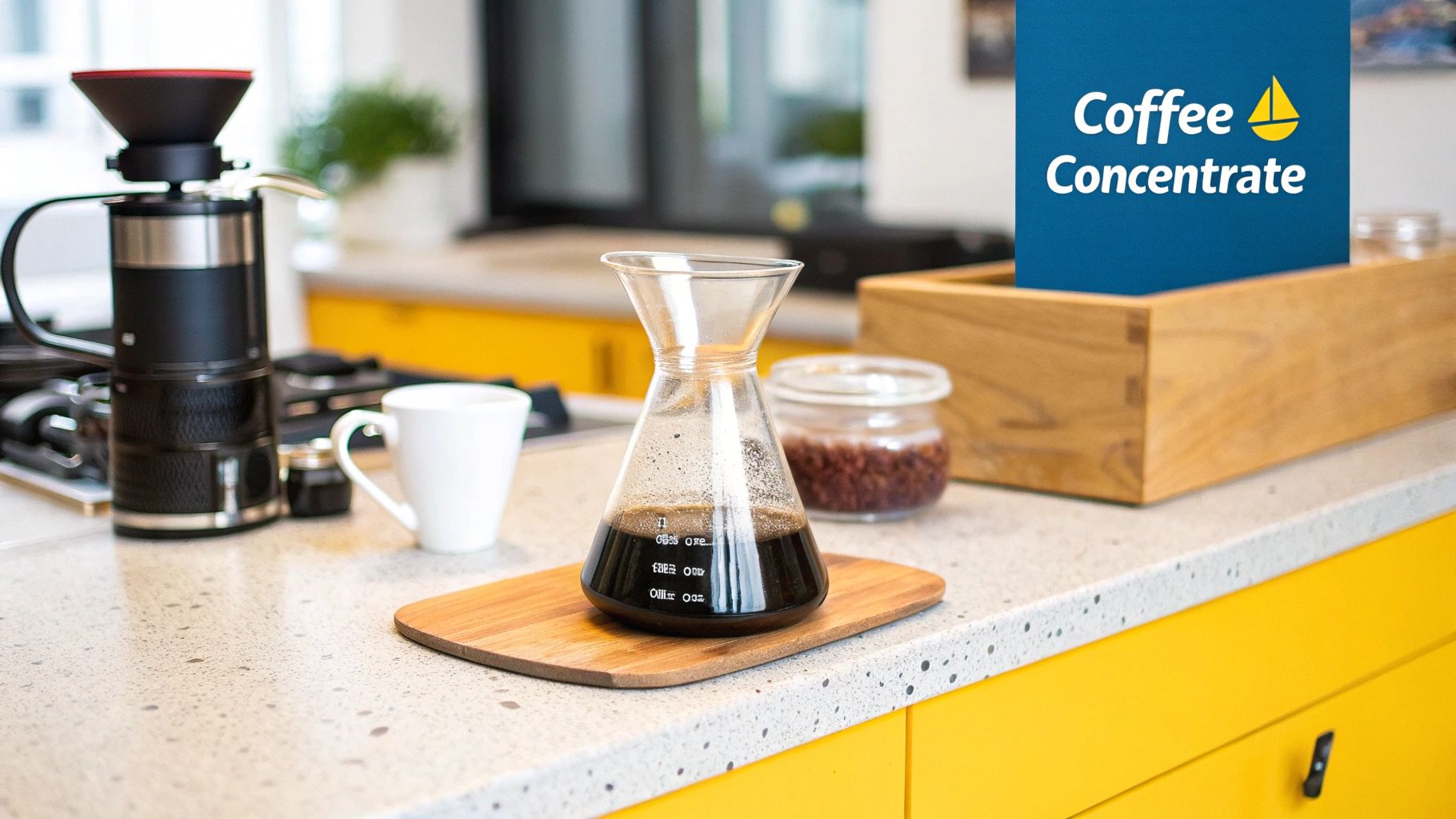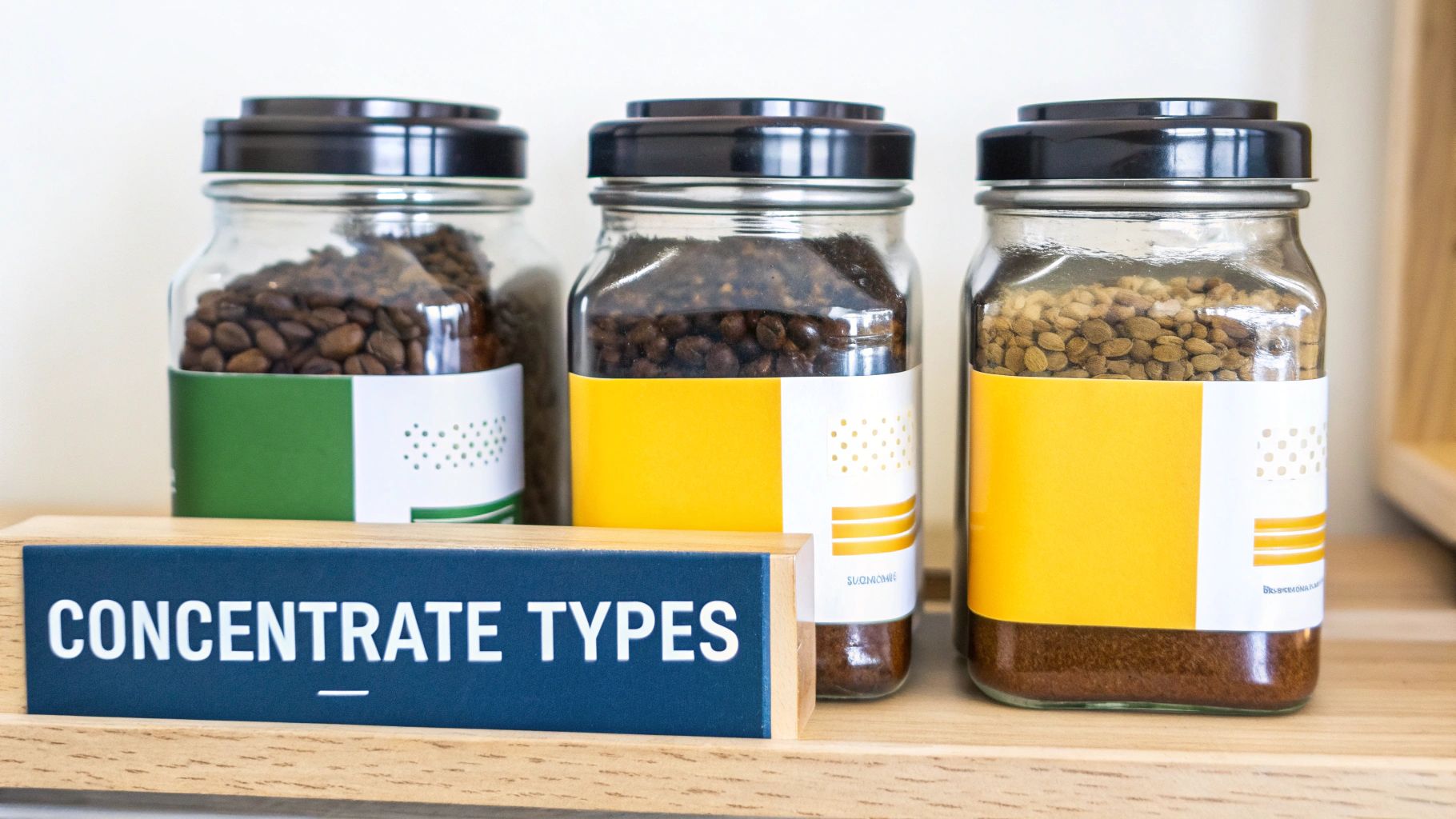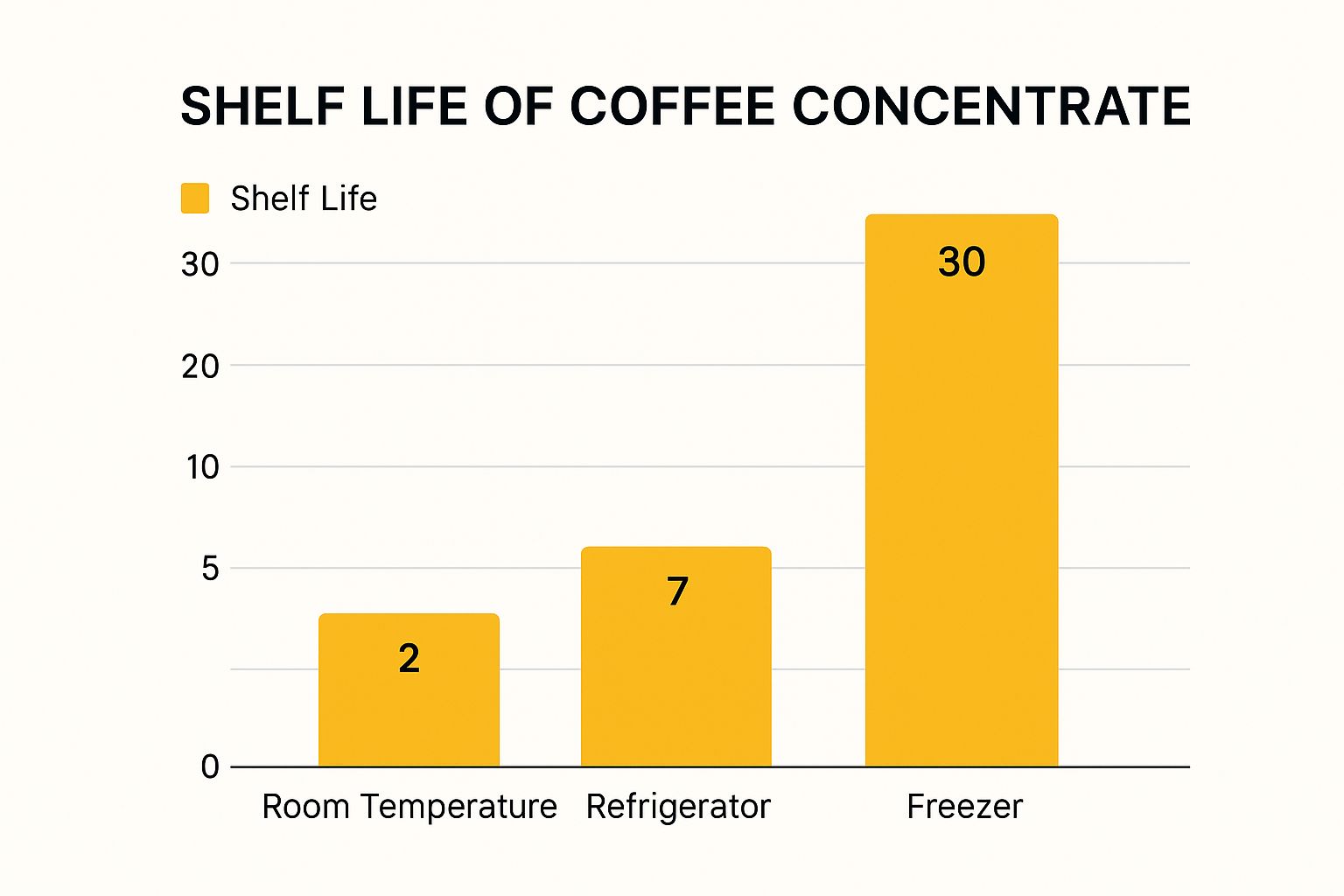Picture your morning coffee, but with most of the water taken out. What you’re left with is a powerful, flavor-packed liquid. In a nutshell, that's coffee concentrate.
Think of it as the espresso of the cold brew world—a strong, versatile base just waiting to be turned into your perfect drink.
So, What Exactly Is Coffee Concentrate?

Coffee concentrate is a super-potent liquid created by brewing coffee grounds with a very low water-to-coffee ratio. This process is all about pulling out the richest flavors, oils, and caffeine from the beans. The result is a powerful brew that’s much, much stronger than your average cup of drip coffee or even a standard cold brew. It’s definitely not meant for sipping straight from the bottle.
Instead, its real magic is in dilution. By adding water, milk, or a non-dairy alternative, you can whip up a perfectly balanced coffee—hot or cold—in seconds. This makes it a total game-changer for anyone who wants quick, consistent, and high-quality coffee at home without needing a bunch of fancy equipment.
The Defining Features of Coffee Concentrate
This liquid gold has a few key traits that really set it apart from other coffee formats. Once you get these, you’ll understand what makes it so special.
- Serious Strength: It has a much higher ratio of coffee solids to water compared to any ready-to-drink coffee. It packs a punch.
- Made for Mixing: The whole point is to dilute it. A common starting point is one part concentrate to two or three parts of your chosen liquid (like water or milk).
- The Ultimate Base: It’s the foundation for just about anything. We’re talking iced lattes, hot Americanos, coffee-infused cocktails, and even desserts.
At its heart, coffee concentrate is all about efficiency. It separates the time-consuming brewing part from the final drink-making, giving you café-quality results in an instant.
How Is Coffee Concentrate Actually Made?

When we talk about making coffee concentrate, it's not a single, one-size-fits-all recipe. The final flavor, acidity, and aroma are all shaped by the brewing method. There are really two main paths you can take: hot brewing and cold brewing.
Each one creates a concentrate with a completely different personality.
The Fast and Bold: Hot Brewing
The hot-brewed method is all about speed and intensity. This approach uses heat—usually steam or very hot water—to pull flavor from the coffee grounds in a hurry. You'll often see this technique used in commercial production because it's incredibly efficient at creating a bold, powerful concentrate.
This method does a great job of holding onto the natural coffee acids, caffeine, and other volatile compounds that give you that classic, robust coffee punch. The concentrate it produces is a fantastic, versatile base for everything from an Americano to a latte, as noted in recent coffee market research.
The Slow and Smooth: Cold Brewing
On the complete other end of the spectrum, the cold brew method is a slow, patient art. It involves steeping coarsely ground coffee in cold or room-temperature water for a long time—we’re talking anywhere from 12 to 24 hours.
This gentle, low-and-slow extraction completely changes the final brew's chemistry. Since there's no heat involved, fewer of the coffee bean's acidic compounds dissolve into the water.
The result? A concentrate that's remarkably smooth, naturally sweet, and far less bitter than its hot-brewed cousin. This mellow flavor profile is precisely why so many people have fallen in love with cold brew.
The best part is how simple it is. You don't need any fancy equipment, which makes it a perfect choice for brewing at home. Just combine your grounds and water, let it steep, and filter it out.
For anyone who enjoys a less intense coffee experience but still wants that convenience, our guide on how to make instant coffee taste better has some great tips that can apply here, too.
Ultimately, the choice between hot and cold brewing is all about your personal taste. Are you after a bold, classic flavor, or a smooth, sweet finish?
Why Coffee Concentrate Is Gaining Global Popularity

Coffee concentrate is making a big move from a niche item to a go-to choice for coffee lovers everywhere. It's a shift powered by a perfect mix of convenience, quality, and a knack for fitting right into our modern lives.
In a world that seems to be moving faster every day, we're all looking for top-notch products that don't eat up our time. Concentrate is the answer. It transforms what can be a multi-step brewing ritual into a simple pour-and-mix affair. It's the ideal fix for a hectic morning or for whipping up a café-quality drink at home without any fancy gear.
This need for speed and quality is also fueling the boom in ready-to-drink (RTD) coffee, and concentrate is a massive player in that market's success. Its stability and bold flavor profile make it the perfect base for all those canned and bottled coffee drinks we love.
A Growing Global Market
The numbers don't lie. They paint a clear picture of this change in our coffee habits. The global market for coffee concentrate was valued at around USD 2.82 billion and is on track to hit USD 4.31 billion by 2032. This surge is particularly strong in emerging markets where city life is evolving at a breakneck pace. You can dig into more of this data over at Fortune Business Insights.
But this growth isn't just about speed; it's about control. We want the freedom to tweak our coffee's strength and flavor, and concentrate delivers that exact level of personalization.
Regionally, Europe has always been a major player, holding a 35.11% market share. But now, we're seeing explosive growth across North America and Asia. This is part of a larger trend of people getting curious about different coffee formats all over the world. For a closer look at how different cultures embrace easy-to-make coffee, check out our piece on exploring coffee culture around the world.
This global appeal proves that more and more people are asking "what is coffee concentrate?"—and then answering that question with their wallets.
The Practical Benefits of Using Coffee Concentrate
Beyond its incredible flavor, coffee concentrate brings a trio of benefits that just make life easier. It nails convenience, consistency, and versatility, putting high-quality coffee within arm's reach, no matter how busy you are.
Unmatched Convenience and Speed
Imagine your five-minute coffee ritual shrinking to about 30 seconds. That’s the magic of coffee concentrate.
There’s no grinding, no waiting for a brewer, and no messy grounds to clean up. You just pour, mix with water or milk, and you’re out the door. This speed is an absolute game-changer on hectic mornings. It also makes playing barista for guests a breeze—you can whip up multiple custom drinks, from iced lattes to hot Americanos, in the time it takes to brew a single pot of drip coffee.
The real beauty of coffee concentrate is how it separates the brewing process from the final drink preparation. You get café-quality results instantly, without the wait.
Flawless Consistency Every Time
We’ve all been there. You make a great cup of coffee one day, but can’t seem to replicate it the next. A tiny shift in water temperature, brew time, or grind size can throw everything off.
Coffee concentrate takes all that guesswork out of the equation.
Because the brewing is already done for you, you get the exact same flavor and strength in every single pour. This reliability means your first sip is just as good as your last, cup after cup. The only thing you control is the final strength by adjusting how much concentrate you use.
Incredible Creative Versatility
While concentrate is perfect for a simple hot or iced coffee, its true potential shines when you think beyond the mug. It’s a dynamic, potent ingredient that can seriously level up dishes in the kitchen.
- Elevate Cocktails: Add a rich, complex coffee kick to espresso martinis, old fashioneds, or other whiskey cocktails.
- Boost Desserts: Drizzle it straight over ice cream, mix it into brownie batter, or use it in tiramisu for a much more intense flavor.
- Enhance Savory Dishes: Use it as a secret weapon in BBQ sauces or meat marinades to add a deep, smoky undertone that guests will never be able to place.
Coffee Concentrate vs. Other Popular Coffee Types
With so many ways to get your caffeine fix, it's easy to get coffee concentrate mixed up with other popular formats. While they all start from the same humble bean, the final products are worlds apart in strength, flavor, and how you use them.
Let's clear up the confusion and put concentrate head-to-head with its closest coffee cousins.
Concentrate vs. Espresso
At first glance, coffee concentrate and espresso seem like they're in the same family—both are potent, concentrated forms of coffee. The real difference, though, is how they get there.
Espresso is all about speed and pressure. Hot water is forced through finely-ground beans in under 30 seconds, creating a small, intense shot with that signature crema on top. It's designed to be sipped and savored right away.
Concentrate, especially the cold-brewed kind, is the complete opposite. It’s a product of patience, steeping for hours to create a smooth, low-acid base that is always meant for dilution. Think of espresso as a sprint and concentrate as a marathon; one is built for instant intensity, the other for versatile, long-term use.
Concentrate vs. Regular Cold Brew
This is where most people get tripped up, and it's an easy mistake to make. Cold brew concentrate is the super-strong, undiluted liquid used to make cold brew coffee. Regular cold brew is the final, ready-to-drink beverage you'd buy at a café—it's already been diluted to a drinkable strength.
Essentially, regular cold brew is the finished product, while the concentrate is the powerful ingredient. You use the concentrate to create the final drink by adding water, milk, or whatever you like.
Concentrate vs. Instant Coffee
Both offer incredible convenience, but that’s where the similarity ends. Instant coffee is made from brewed coffee that has been completely dehydrated, leaving behind soluble crystals or powder. Just add hot water, and you've rehydrated it back into coffee.
Coffee concentrate, on the other hand, is a liquid that has never been dehydrated. This is a huge deal because it preserves more of the coffee's original oils and nuanced flavors that are often lost in the drying process. For a deeper dive, you can explore the key differences between ground and instant coffee in our detailed guide.
It seems coffee drinkers agree, as liquid formats are incredibly popular. Bottled coffee concentrates and ready-to-drink options capture 43.3% of the market share thanks to their amazing convenience.
How Coffee Concentrate Compares to Other Coffee Types
To really see how these coffee types stack up, let's break down their key characteristics in a simple table. This makes it easy to spot the unique role each one plays in the coffee world.
| Attribute | Coffee Concentrate | Espresso | Regular Cold Brew | Instant Coffee |
|---|---|---|---|---|
| Form | Liquid | Liquid | Liquid | Dry Crystals/Powder |
| Strength | Very High (undiluted) | High (undiluted) | Medium (diluted) | Varies (rehydrated) |
| Brew Time | 12-24 hours | Under 30 seconds | 12-24 hours | Instant |
| Acidity | Very Low | High | Low | Medium |
| Best For | Versatile base for drinks | Quick, intense shot | Smooth, ready-to-drink | Ultimate convenience |
As you can see, coffee concentrate really carves out its own niche. It's not just another way to make coffee; it's a powerful and flexible ingredient for crafting your perfect drink.

The key takeaway? Popping your concentrate in the fridge is the best way to keep it fresh and delicious for up to a week.
Got Questions About Coffee Concentrate? We've Got Answers.
Alright, let's clear up some of the common questions that pop up when people first dive into the world of coffee concentrate. Think of this as your quick-start guide to using and enjoying it like a pro.
How Should I Store Coffee Concentrate?
Proper storage is the secret to keeping your concentrate tasting fresh and delicious. The best way to maintain its flavor is to pop it in a sealed, airtight container and keep it in the fridge. Simple as that.
When you do this, most homemade or freshly opened concentrates will stay good for about two weeks. After that, you might notice the flavor losing its punch and tasting a bit flat. Always give the label a quick look on store-bought versions, as their shelf life can vary.
The golden rule for freshness is a simple one: keep it cold and keep it sealed. This little step is your best defense against oxidation, which is what robs your coffee of those delicate flavors you love.
Is Coffee Concentrate The Same As Cold Brew?
This is a super common question, and it's easy to see why there's confusion. But the difference is pretty important.
Often, when you hear "cold brew," people are talking about the final, ready-to-drink beverage you'd grab at a coffee shop. "Cold brew concentrate," on the other hand, is the super-strong, undiluted stuff used to make that drink.
So, you could say that cold brew concentrate is one type of coffee concentrate, but not all concentrates are made using the cold brew method. The biggest difference you'll taste is the strength—concentrate is the potent base, and regular cold brew is the finished product.
Can You Drink Coffee Concentrate Straight?
We'd strongly advise against it! Because it's so potent, the flavor would be completely overwhelming on its own.
More importantly, the caffeine kick in a small, undiluted serving can be massive. We're talking potential jitters, anxiety, or an upset stomach. This stuff is specifically made to be mixed, usually at a ratio of one part concentrate to two or three parts water, milk, or whatever else you're adding.
What Is The Best Coffee Concentrate To Buy?
The "best" bottle is really all about your personal taste. What do you look for in a great cup of coffee? Your answer will point you in the right direction.
- If you like it smooth and low-acid: A concentrate made using the cold brew method is your best bet. That gentle extraction process creates a naturally sweet and mellow flavor.
- If you're after a bolder, classic coffee flavor: Go for a hot-brewed concentrate. It will deliver that robust, traditional taste you're probably used to.
A good tip is to read some customer reviews and check the bean origin (100% Arabica, for example, usually means a smoother cup). This can help you find a brand you'll absolutely love.
At Cartograph Coffee, we're all about making exceptional coffee accessible to everyone, everywhere. Our organic instant coffee gives you the ultimate convenience without ever sacrificing the rich, delicious flavor you deserve. Discover your new go-to coffee solution at https://cartographcoffee.com.